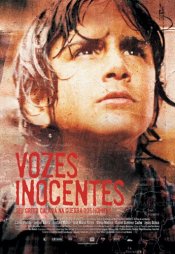

Elements from history and real life are developed in the movie's story
The movie tells many things that already happened and some other things that are still happening today. For example, it's really evident that the movie shows a civil conflict between the government army and the FMLN. It's kind of gloomy to say that what started as an agrarian conflict lasted as a brutal conflict between the Salvadoran government army and the rural people (FMLN).
Another fact the movie shows is the recruiting of children in wars.
Nowadays, there are more or less 300,000 kids fighting in wars around the world in more than 40 countries. Actually this was the main reason that leaded the director (Luis Mandoki) to make the movie.
The church is another important element. Basically, the church in wars influences itself in everything. It has a straight position towards wars. It says that god gave men the possibility to choose our own acts; rather they're good or bad.
The church's influence is the main reason that leads to many deaths of priests around the world.
Another element is the inequality, poverty, injustice with inocent people.
For example, in the movie, the setting is in Cuscatanzingo which was one of the last towns trapped between the two opposition sides, the army and the guerrilla. I mean, they don't even care a bit about it.
Causes & effects of the problems or situations expressed by the movie
This brutal conflict which lasted for 12 long years, leaved many horrible consequences. It leaved 75,000 deaths; leaved 1 million vide (exile) people.
U.S. also sent military support. Economically (1,000 million dollars) and personal (to train, to give advices).
Conclusion the movie tries to establish
The conclusion the movie tries to show is that actually; a civil war is no longer more than a war between brothers.
The movie for me is a real life story of what it is lost in war times and what it is discovered in a little child's spirit.
I think that in their innocent world, children are free to laugh, to love, to dream. But for many children that possibility ended very quickly.
As Mandoki says: "in adverse times, hope can be found in a kid's eyes".
Profile: characters
Chava.
He's a poor child. He thinks he has to maintain his family because his dad left'em (his family) in the middle of the war and for so, he thinks he's the man of the house. He fights against recruitment.
Uncle Beto
He's like the intermitent paternal figure. He entered the guerrills because the army pursuit him because of the protests songs he used to sing. He thinks that the melancholic song during the war is like a deep breath to such many drama.
The Priest
He has a straight posture in everything that happens. He says that god gave men the possibility to choose their own actions; rather they're good or bad.
The Grandmother (mama toya)
For me, she's a heroine because grandmothers usually are the columns of society because they educate, they instruct. She fights not prcisely with weapons. She's always in a spiritual advance, self-progress.
Ancha
He's a retarded person. He's very sensitive. He doesn't live in the war, that's just his way of living.
Best scene from the movie that reflects the message of the director
For me, there are three basic moments which shows the director's point of view.
The first one is when Chava is at school in recess and he sees a girl she likes very much when suddenly the army enters and starts the recruitment. I think this scene is a contrast between the tenderness of the first love and the fear to be recruited by the army when you're 12 years old.
The second one is a join of many scenes of joy. For example, the scene in the tree, paper glowworms scene, the scene when Chava starts dancing with some other friends he had and when Chava makes a long run beside the bus. From this join of scenes I think that since the movie is tolled through a kid's glance, this gaze travels us to moments of joy, to moments of sadness, moments of tenderness, moments of great pain.
It's a very emotional trip.
The third scene is the scene of the ambush in the forest when Chava grabs a weapon and wants to kill a soldier but then he realizes that the the soldier was a kid, so he leaves the weapon in the ground and start running away from the combat zone. I think that this scene is a feeling of duality between the desire to kill those who were killing his people and life.
Best phrase from a character in the movie that besides caughting my attention, reflects the director's message.
-"Tengo mucha sed, me duelen los pies, tengo piedras en el zapato (...) seguro nos van a matar, ¿por qué nos quieren matar si no hicimos nada?"-.
The only things children are guilty for are for playing and for having fun. They're not mentally prepared to fight in a war.
No hay comentarios:
Publicar un comentario